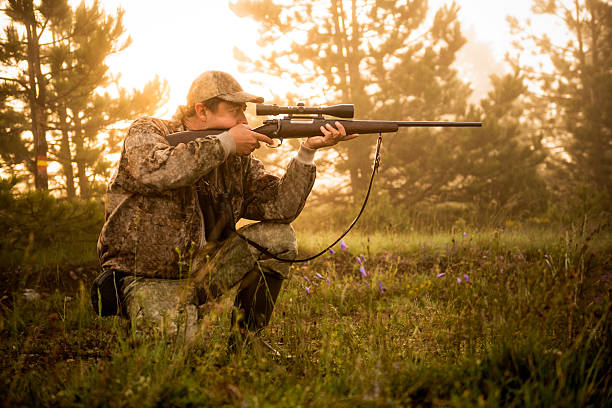What Is Conservation Hunting?
Conservation hunting refers to the regulated, ethical harvest of specific game species under scientific management plans. In Namibia, this is not only legal—it’s essential. Unlike poaching, which devastates ecosystems, conservation hunting is quota-based and regulated, targeted at older, non-breeding males, used to generate funding for anti-poaching units and conservation, and structured to benefit local communities and landowners.
It’s a cornerstone of Namibia’s conservation success and a key reason populations of species like black rhino, oryx, and elephant are stable or increasing in private reserves.
How Private Game Lodges Implement Conservation Hunting
1. Wildlife Population Control
Private lodges manage vast areas teeming with plains game and predators. Without population control, overgrazing, disease, or aggressive expansion of species like elephants can destabilize ecosystems. Older, non-reproductive males are targeted. Hunting seasons avoid mating and birthing periods. Scientific data guides quotas and species selection.
2. Funding Conservation Initiatives
Luxury safari experiences alone may not generate enough revenue to support full-scale conservation programs. Conservation hunting provides a supplementary income stream to fund anti-poaching patrols, veterinary care for injured wildlife, research partnerships with universities, and habitat restoration such as water hole management or invasive species removal.
3. Creating Economic Incentives for Landowners
Private landowners are more likely to preserve wildlife habitats if they derive tangible benefits. Income from hunting and non-hunting guests allows lodges to avoid converting land into farms or mines.
4. Monitoring and Data Collection
Lodges engaging in conservation hunting must document animal age, condition, and location. This data is vital for adjusting game management plans, tracking population health and migration, and preserving genetic diversity.
Sustainability Through Controlled Use of Resources
In many lodges, ethical hunting occurs alongside photographic safaris. This dual approach ensures low tourism density, diverse income streams, and reduced pressure on animals and land. By operating below carrying capacity and rotating hunting zones, lodges prevent ecosystem degradation. Wildlife isn’t chased or overcrowded, creating a more authentic and sustainable experience.
Community Engagement and Empowerment
Local communities are stakeholders in Namibia’s conservation model. Private lodges help uplift rural economies by providing jobs (rangers, trackers, chefs, guides), sharing revenue with surrounding villages, supporting schools and clinics, and educating youth on conservation and guiding careers. When locals benefit from conservation, they become its fiercest protectors.
Anti-Poaching and Security Measures
Poaching remains a threat in Africa. Private lodges invest significantly in surveillance systems, trained ranger units, and collaborations with national law enforcement. Revenue from hunting licenses and guests supports these efforts. Maintaining a physical and human presence deters illegal activity.
Measurable Impact: Namibia’s Success Story
Namibia was the first African nation to incorporate environmental protection into its constitution. Since then, over 50% of Namibia’s wildlife exists outside national parks. Conservancies and private lodges manage millions of hectares. Endangered species like cheetahs and black rhinos have seen population rebounds.
According to the Ministry of Environment, Forestry, and Tourism, wildlife populations on private land have increased over 80% since the implementation of legal conservation hunting and tourism policies.
Examples of Lodges Leading the Way
1. ARU Game Lodges
ARU exemplifies a holistic approach: combining luxury hospitality, conservation hunting, and ecological preservation on two vast private reserves. With a strong focus on sustainability, ARU funds local employment, wildlife tracking, and long-term habitat protection through carefully managed hunting experiences.
2. Okonjima Nature Reserve
Home to the AfriCat Foundation, Okonjima offers luxury stays while supporting large predator research. Conservation hunting on surrounding land helps balance animal populations and fund operations.
3. Zannier Reserve by N/a’an ku sê
Though not a hunting reserve, this lodge demonstrates how varied Namibia’s conservation model is—some focusing solely on photography, others on multi-use systems that include hunting as a conservation tool.
FAQs
1. Is conservation hunting legal in Namibia?
Yes, it is fully legal and regulated by the Ministry of Environment, Forestry and Tourism. Permits, quotas, and animal welfare standards are strictly enforced.
2. How does conservation hunting help wildlife?
By funding anti-poaching, scientific research, and land preservation. It also prevents habitat conversion by making wildlife economically valuable.
3. Do tourists support conservation just by staying at a private lodge?
Absolutely. Even if you don’t hunt, your stay supports jobs, eco-monitoring, and the infrastructure needed to sustain wildlife populations.
4. Is it possible to visit a lodge that practices hunting without participating?
Yes. Many lodges offer non-hunting packages, and hunting activities are separate and discreet, ensuring all guests enjoy their experience.
5. What species are typically included in conservation hunting?
Plains game such as kudu, oryx, impala, and occasionally larger species like eland or giraffe, depending on population levels and land capacity.
A Model Worth Preserving
Namibia’s use of conservation hunting as a funding and land management tool is a unique model in Africa. It challenges the often polarizing views around hunting and proves that, when ethically managed, hunting can coexist with eco-tourism, sustainability, and wildlife preservation.
Private game lodges are on the front lines of this movement. Their multifaceted role—part luxury host, part conservationist, part community partner—is redefining what it means to protect Africa’s wildlife in the 21st century.
Final Thoughts
In Namibia, the wilderness has value—not just as a picturesque backdrop for tourists but as a livelihood for locals, a habitat for endangered species, and a legacy for future generations. Private game lodges are more than places to stay—they are stewards of the land.
For travelers seeking authentic, ethical, and impactful experiences, supporting lodges that embrace conservation hunting and sustainable tourism isn’t just a choice—it’s a contribution to the future of Africa’s wildlife.
